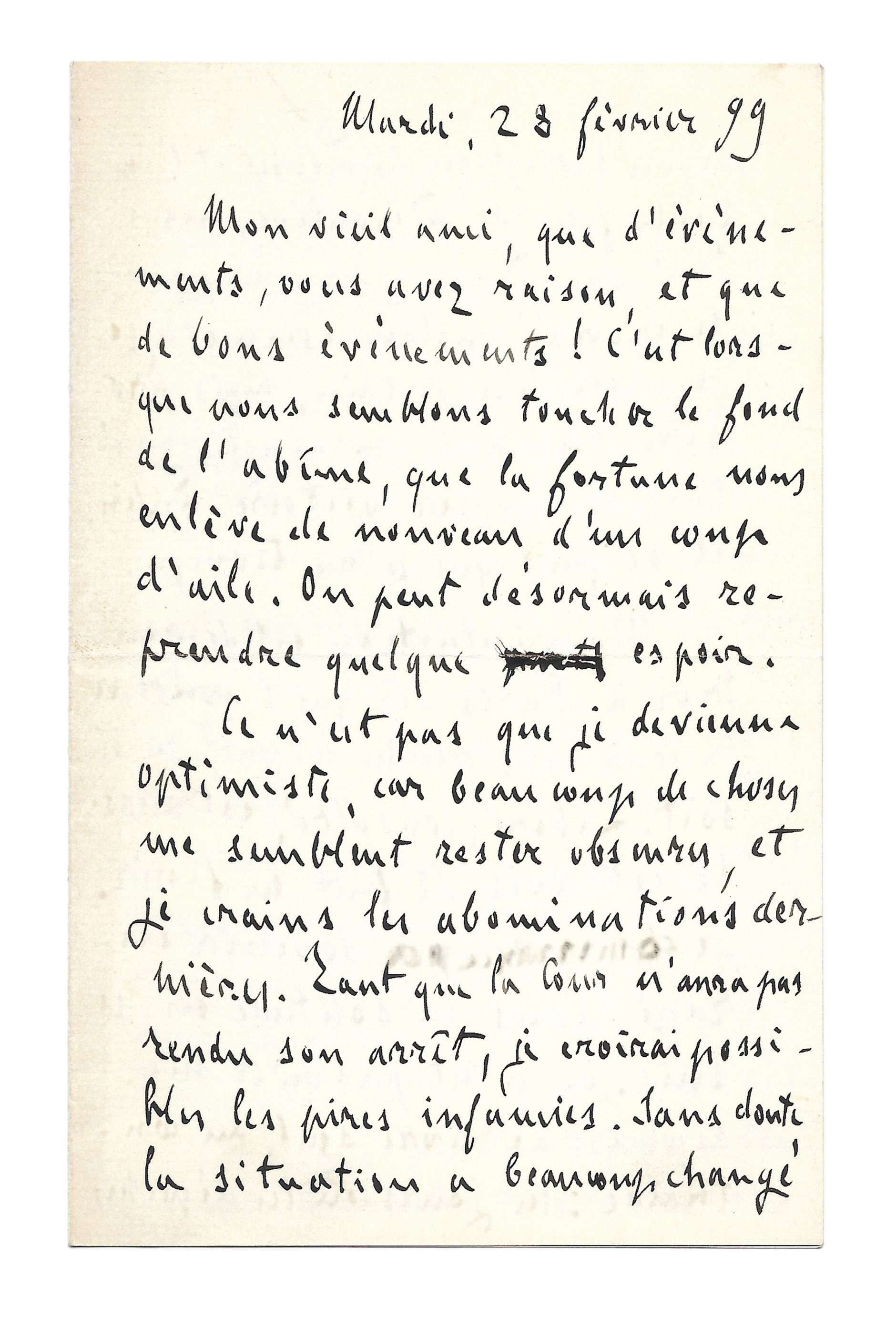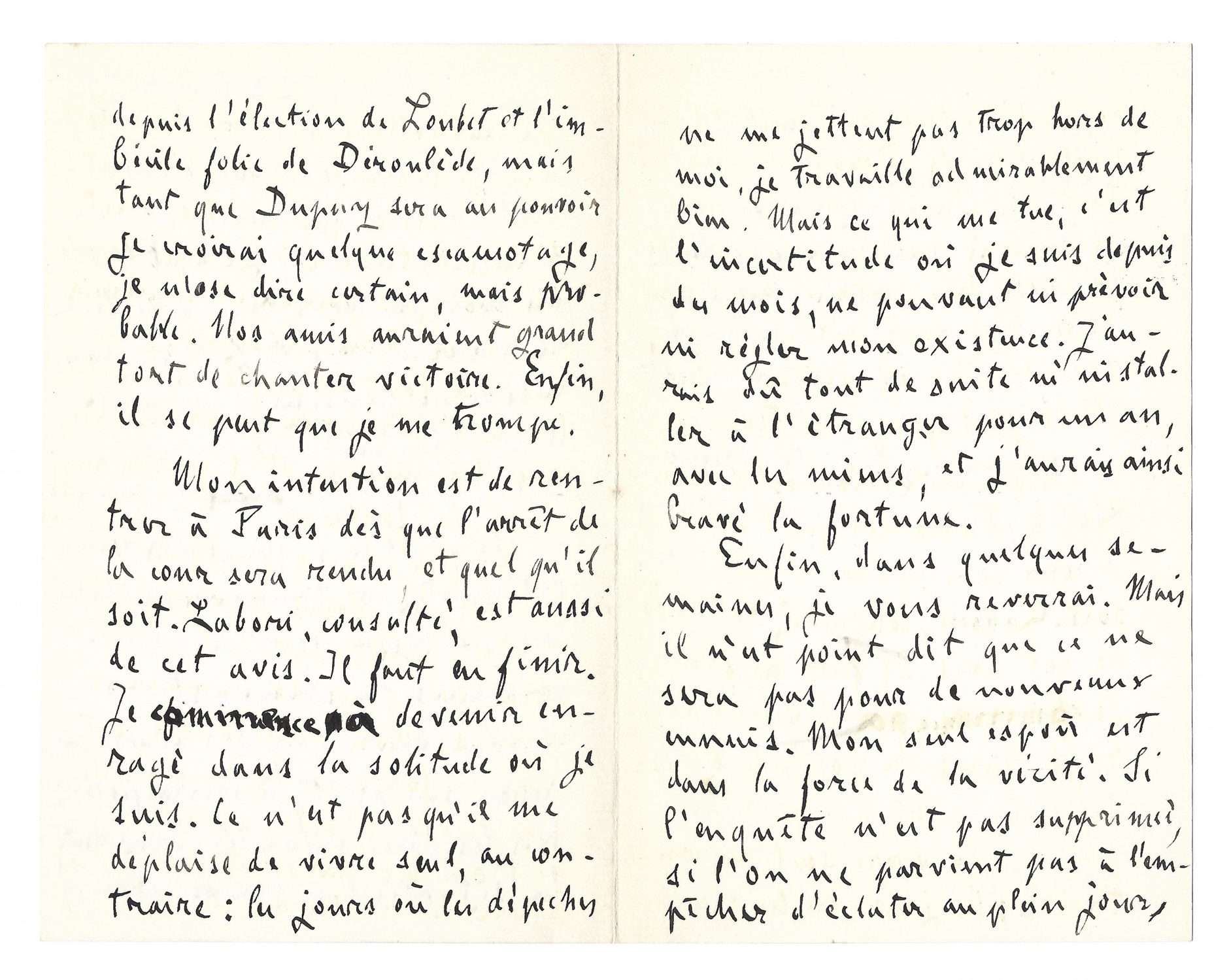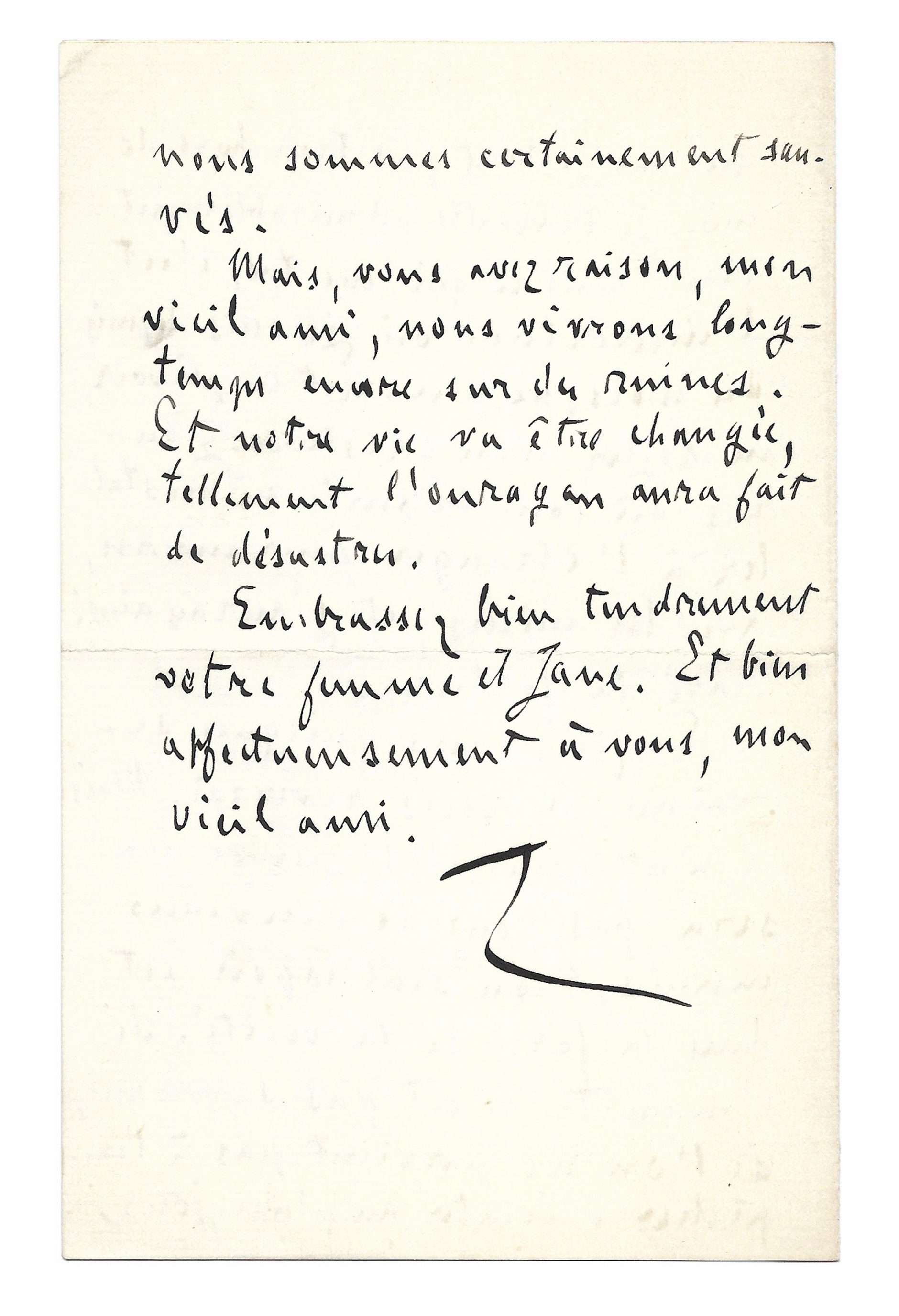ZOLA, Emile (1840-1902)
Autograph letter signed “Z” to Georges Charpentier
London, Tuesday 28th February [18]99, 4 pages in-8
“My only hope lies in the force of truth”
Fact sheet
ZOLA, Emile (1840-1902)
Autograph letter signed “Z” to Georges Charpentier (his edidor for the Rougon-Macquart saga)
London, Tuesday 28th February [18]99, 4 pages in-8
Central fold mark, in fine condition
Exceptional letter of exile from the novelist, with prophetic formulas, reacting to Felix Faure’s recent death and the latest twists around the Dreyfus Affair
“Mon vieil ami,que d’évènements, vous avez raison, et que de bons évènements ! (1) C’est lorsque nous semblons toucher le fond de l’abîme, que la fortune nous enlève de nouveau d’un coup d’aile. On peut désormais reprendre quelque espoir.
Ce n’est pas que je devienne optimiste, car beaucoup de choses semblent rester obscures, et je crains les abominations dernières. Tant que la cour [de cassation] n’aura pas rendu son arrêt, je croirai possible les pires infamies.(2) Sans doute la situation a beaucoup changé depuis l’élection de [Émile] Loubet (3)et l’imbécile folie de [Paul] Déroulède(4), mais tant que [Charles] Dupuy (5) sera au pouvoir je croirai quelque escamotage, je n’ose dire certain, mais probable. Nos amis auraient grand tort de chanter victoire. Enfin, il se peut que je me trompe.
Mon intention et de rentrer à Paris dès que l’arrêt de la cour sera rendu, et quel qu’il soit. [Fernand] Labori [avocat de Alfred Dreyfus et Emile Zola], consulté, est aussi de cet avis. Il faut en finir. Je commence à devenir enragé dans la solitude ou je suis. Ce n’est pas qu’il me déplaise de vivre seul, au contraire : Les jours ou les dépêches ne me jettent pas trop hors de moi, je travaille admirablement bien. Mais ce qui me tue, c’est l’incertitude où je suis depuis des mois, ne pouvant ni prévoir ni régler mon existence. J’aurais dû tout de suite m’installer à l’étranger pour un an, avec les miens, et j’aurais ainsi bravé la fortune.
Enfin, dans quelques semaines, je vous reverrai. Mais il n’est point dit que ce ne sera pas pour de nouveaux ennuis. Mon seul espoir et dans la force de la vérité. Si l’enquête n’est pas supprimée, si l’on ne parvient pas à l’empêcher d’éclater au plein jour, nous sommes certainement sauvés.
Mais vous avez raison, mon vieil ami, nous vivrons encore longtemps sur des ruines. Et notre vie va être changée, tellement l’ouragan aura fait de désastres.
Embrassez bien tendrement votre femme et Jane. Et bien affectueusement à vous, mon vieil ami.
Z”
1- Emile Zola rejoices in the death of President Félix Faure – a determined opponent of the review of the trial and a notorious anti-dreyfusard – who died 15 days earlier in the arms of his mistress at the Élysée Palace.
2- On October 27, 1898, the Criminal Chamber of the Court of Cassation began considering the application for review. It was not until 3 June 1899, after multiple hearings, that the Court of Cassation overturned the 1894 judgment and referred the matter to a new War Council.
3- It should be noted that it was Emile Loubet (1838-1929) – president of the republic who succeeded Félix Faure on 18 February 1899 – who granted the presidential grace to Alfred Dreyfus on 19 September 1899 following the resounding trial in Rennes in August.
4- Paul Déroulède (1846-1914) is a French poet, novelist and political activist. He was the founder of the League of Patriots, one of the pioneering movements of French nationalism. Although an advocate for the army, he believed in Dreyfus’ innocence. Zola refers here to his attempted Coup during the funeral of Felix Faure on February 23, 1899. Arrested, acquitted in court of assizes, tried in the High Court and finally banned (deported to Spain), he was granted an amnesty in 1905.
5- Charles Dupuy (1851-1923) is a French statesman. He became Chairman of the Council in November 1898 and was strongly opposed to the trial review, hence Zola’s skepticism.
Following his open letter J’accuse…! to President Félix Faure, published in L’Aurore on January 13, 1898, Emile Zola was taken to Court by General Billot. Emile Zola’s trial will take place from 7 February to 23 February through fifteen hearings. After several legal twists, Emile Zola was finally sentenced to the maximum sentence of one year in prison and a fine of 3,000 francs on 18 July 1898. Pushed into exile by his lawyer Fernand Labori and George Clemenceau (then editor-in-chief of the newspaper L’Aurore), Emile Zola went on an 11 months exile, forced into media silence but openly expressing his commitment to his relatives as evidenced by this letter.
Because he felt spied on and under surveillance, Zola ensured that his anonymity was as preserved as possible. It should be noted that only the writer’s letters of exile were signed with an “E” and later a “Z” which were for him a way of encrypting his mailings, although his writing was recognizable among a thousand. Struck by homesickness, he is deeply affected by the state of political affairs in France (“Never has the situation been, in my opinion, more disastrous”). Alexandrine, his wife, gives him unwavering support and encourages him to continue his struggle.
George Charpentier (1846-1905) was a famous French publisher of the second half of the 19th century. He defined himself as “the publisher of naturalists.” He published Zola [of whom he was a close friend who was one of a handful friends to visit him during his exile in London], Gustave Flaubert and Maupassant. He was also an avid art collector who promoted Impressionist painters.
Note: This letter is published in the IXth volume of the Zola’s General Correspondence (CNRS, t. IX, 1993)





